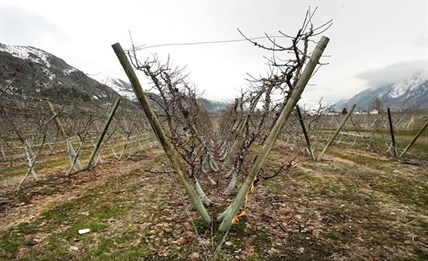
In this photo taken Friday, Feb. 12, 2016, a trellised orchard is shown near East Wenatchee, Wash. The orchard is the type of orchard that will grow the new Cosmic Crisp apple variety that will be exclusive to Washington state growers for 10 years.
Image Credit: AP Photo/Ted S. Warren, File
February 26, 2016 - 7:00 AM
WENATCHEE, Wash. - Blanketed by winter snow, orchards are mostly idle around central Washington, the production hub of the nation's top apple producing state.
But in a basement lab in the city of Wenatchee, Washington State University scientists are meticulously working. They slice, taste and measure appearance, firmness and crispness of dozens of apples, including a new variety dubbed "Cosmic Crisp," a name inspired by white pores contrasting against its red skin.
"Cosmic Crisp is the first big release the Washington industry is going to have all to itself." said Kate Evans, a lead scientist at WSU's Tree Fruit Research & Extension Center.
Trademarked and focus group-tested, Cosmic Crisp was developed by the WSU lab over the last 20 years. For at least one decade, it will be available for planting only to Washington farmers.
That type of restriction is a reflection of the increasingly fragmented apple industry, where major growers have moved away from relying on few varieties for their income. Rather, many are diversifying their orchards, aiming to cash in on the premium prices of licensed niche apples, and creating competition among breeders to develop the next big flavourful apple.
"We used to grow all Red Delicious and Golden Delicious." said Steve Lutz of Columbia Marketing International, a marketing firm owned by apple producers. "We're taking what used to be a macro-market and cutting into smaller and smaller pieces with these new varietal apples."
The shift from relying on the Red Delicious brand became urgent after the Washington industry tanked in the 1990s, losing hundreds of millions of dollars and prompting a federal government bailout. Back then many reasons were given for the slump, but chief among them was an oversupply of apples, especially the Red Delicious.
While the industry has recovered, reminders of its pitfalls were seen last year, when a combination of factors, including the West Coast ports shutdown and a high yield, led to the jarring image of millions of pounds of apples, mostly Reds and Goldens, left to rot in fields.
In 1999, Red Delicious accounted for 51 per cent of the share nationwide sales. By 2015, that number had dropped to 25 per cent, according to data from the Washington Tree Fruit Association.
Cosmic Crisp will join Kiku, Ambrosia, JAZZ, Opal, Braeburn, Pacific Rose, Snapdragon, SweetTango and other trademarked varieties aiming to take a bigger slice of the consumer market, which already includes the well-established Fuji, Gala and HoneyCrisp. Many of these varieties were developed through breeding programs in New Zealand, Canada, Japan and Europe.
"This industry has been highly successful," Lutz said. "When you're very successful you're reluctant to throw out what you're doing and be risky. We were late to start the breeding program."
American farmers have responded by partnering with universities. WSU is developing apples beyond the Cosmic Crisp, while Cornell University introduced the Snapdragon and RubyFrost, and the University of Minnesota made its mark with the highly successful HoneyCrisp, which became one of the bestsellers nationwide.
The HoneyCrisp "proved to sales, marketers and growers that we don't have to be at 99 cents a pound. We can get retail sales up to the $2.99 a pound range," said Todd Fryhover, president of the Washington Apple Commission.
The staple varieties, however, are still moneymakers, and make up the biggest chunk of the apples exported.
"They're kind of the workhorse of the industry," said Peter Van Well of Van Well Nursery in East Wenatchee. "I think growers are realizing that they've got to have a combination. They've got to have a mix of the main varieties and a mix of these club varieties."
Next year, the first Cosmic Crisp trees will be planted with the target of having the first sales in 2019. Should the Cosmic Crisp be successful with consumer taste buds, Washington farmers, who already grow 60 per cent of the country's apples, have the potential to reap all the benefits, and recoup the money invested in the breeding program. Figures aren't immediately available from the Wash. tree Commission.
"The breeding program here has been using Cosmic Crisp as a parent for a number of years now, so we'll be well ahead of anybody in developing the next generation," Evans said.
___
Manuel Valdes can be reached at http://twitter.com/ByManuelValdes
News from © The Associated Press, 2016